Sarah Ward's Blog, page 14
November 11, 2016
Music to Write Books By – Ruth Frances Long
 Today on Crimepieces, I have Ruth Frances Long. Ruth writes dark young adult fantasy, often about scary fairies, such as The Treachery of Beautiful Things, A Crack in Everything, A Hollow in the Hills and the newly released A Darkness at the End. As R. F. Long, she also writes fantasy and paranormal romance.
Today on Crimepieces, I have Ruth Frances Long. Ruth writes dark young adult fantasy, often about scary fairies, such as The Treachery of Beautiful Things, A Crack in Everything, A Hollow in the Hills and the newly released A Darkness at the End. As R. F. Long, she also writes fantasy and paranormal romance.
She lives in Wicklow and works in a specialized library of rare, 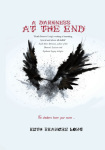 unusual & occasionally crazy books. In 2015 she won the European Science Fiction Society Spirit of Dedication Award for Best Author of Children’s Science Fiction and Fantasy.
unusual & occasionally crazy books. In 2015 she won the European Science Fiction Society Spirit of Dedication Award for Best Author of Children’s Science Fiction and Fantasy.
Hi Ruth, do you have particular pieces of music you write to?
I don’t have specific pieces but I often use film soundtracks. I love the emotion and energy they convey, the different moods the various pieces evoke. I am slightly obsessed with movies and the way they use music so you’ll see a very strong theme in my answers. For example I particularly like the How to Tame Your Dragon soundtracks by John Powell. I love the differences between the soundtracks for the first and second films, the contrast of orchestral in the first and choral in the second and the way various themes repeat and are developed throughout.
Has a particular piece of music ever inspired you to write something?
Music always inspires me and I often find a particular piece of music which ties in with my books, and with my characters. For example I always loved the song The Sound of Silence by Simon and Garfunkle but when I heard the version by The Disturbed it tied in perfectly with everything about A Darkness at the End, the final book in my Dubh Linn trilogy – right down to the voice and the arrangement. It’s so sinister and powerful and speaks to many of the conflicts my characters encounter. So the two married together.
Could you recommend any particular pieces of music for a specific mood ?
If I want to write something really swashbuckling and exciting I love the tracks called Surfing and Heroics from the soundtrack of Sinbad: Legend of the Seven Seas by Harry Gregson-Williams. I generally run a few tracks together here or let the whole soundtrack run on. It’s fabulous stuff. Really uplifting and thrilling.
Are there any longer pieces you can recommend. If you need to write for an hour, for example, is there a particular composer/artist you’d chose?
Again I am back to the soundtracks – John Powell, Dario Marianelli, John Williams (of course), and Howard Shore. For an especially long session I would choose something like the Lord of the Rings soundtrack (all of it – hours and hours of wonderful music), or create a playlist mixing all of them together.
What are you working on at the moment?
I am about to start back into work on edits of a Space Opera so there will be plenty of swashbuckling and adventurous music – all the above of course. But I’m leaning towards Michael Giacchino this time. (Jupiter Ascending, Star Trek, John Carter).
Thanks, Ruth for taking part in this series and good luck with the writing. Ruth’s social media links can be found below.
http://www.rflong.com
@RFLong on Twitter
Facebook Page
The Treachery of Beautiful Things on Facebook
A Crack in Everything (O’Brien Press, 2014)
A Hollow in the Hills (O’Brien Press, 2015)
A Darkness at the End (O’Brien Press, September 2016)


November 10, 2016
Review: Doug Johnstone – Crash Land
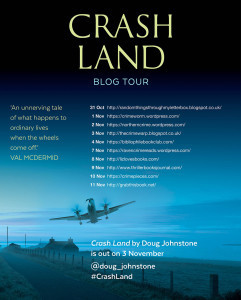 I had a wonderful time in Shetland when I visited it last year for Shetland Noir and I’ve had a hankering ever since to visit Orkney. It’ll probably be a while before I get the chance but, in the meantime, I’ve visited the archipelago in the latest book by Doug Johnstone.
I had a wonderful time in Shetland when I visited it last year for Shetland Noir and I’ve had a hankering ever since to visit Orkney. It’ll probably be a while before I get the chance but, in the meantime, I’ve visited the archipelago in the latest book by Doug Johnstone.
Crash Land opens at Kirkwall Airport where Finn Sullivan is waiting for a plane to get out of Orkney and home for Christmas. He helps a woman escape the unwanted attention of a group of men but when they board a flight to Edinburgh trouble kicks off which ends in the plane crash landing. The woman, Maddie Pierce, disappears and, as one of the few survivors, Finn is left to both answer the police’s questions and help Maddie.
As I’d expect from Johnstone’s books, Crash Land is a taut, well-written thriller with an interesting premise. There are elements, however, that elevate it about the average crime novel. Finn Sullivan is young, only twenty-one and it make for an interesting dynamic that he is in thrall to a woman ten years older than himself. He makes jewellery for a living which contrasts well with his ability to roll up his sleeves and get involved in a fight when needed. There’s a sense of youthful bullishness about him and they way he is willing to get involved in Addie’s plight.
Orkney is well depicted, especially the small-windswept airport as is the Tomb of the Eagles which makes for an atmospheric backdrop to the story. The asides about Orkney culture and its attitude to mainland Scotland were fascinating and just what an armchair reader needs to transport you to the island. Crash Land is a perfect length – the story is told in 250 pages and, for me, it was a great autumn read.


November 4, 2016
Music to Write Books By – Sandra Danby
 Today on Crimepieces, I have Sandra Danby. Sandra is the author of Ignoring Gravity in which a journalist researches the truth of her adoption as a baby. It is first in the ‘Rose Haldane: Identity Detective’ series. The second, Connectedness, will be published in 2017. Sandra’s stories are published in anthologies Diaspora City and The Milk of Female Kindness. Although she is fascinated by the subject of identity, adoption and families, she was not herself adopted. Originally from East Yorkshire, she ran away to London be a journalist. As a child she played recorder, violin, clarinet, piano and sang in choirs. She can still read music [sort of].
Today on Crimepieces, I have Sandra Danby. Sandra is the author of Ignoring Gravity in which a journalist researches the truth of her adoption as a baby. It is first in the ‘Rose Haldane: Identity Detective’ series. The second, Connectedness, will be published in 2017. Sandra’s stories are published in anthologies Diaspora City and The Milk of Female Kindness. Although she is fascinated by the subject of identity, adoption and families, she was not herself adopted. Originally from East Yorkshire, she ran away to London be a journalist. As a child she played recorder, violin, clarinet, piano and sang in choirs. She can still read music [sort of].
Hi Sandra – Do you have particular pieces of music you write to?
These are the four instrumental favourites I never tire of listening to while writing:-
1 Gustav Holst’s ‘Venus’ from ‘The Planets’;
2 Max Bruch’s ‘Vorspiel’ from ‘Violin Concerto No I in G Minor OP 26’;
3 Antonio Vivaldi’s ‘Allegro non Molto’ from ‘Concerto No 4 in F Minor L’inverno’ [The Four Seasons: Winter];
4 Beethoven’s ‘Cello Sonata No 3 in A’ played by Jacqueline du Pré,
Has a particular piece of music ever inspired you to write something?
By chance one day listening to the car radio, I heard an extract from Benjamin Britten’s Peter Grimes. I went home and ordered the CD, the classic version with Britten conducting and the part of Grimes sung by Peter Pears, Britten’s partner. It is a dramatic story. Grimes, a lonely fisherman, is accused of causing the death at sea of his apprentice. He is let off and cautioned not to employ another boy. But he does. And the second boy dies. The town takes against Grimes, and he descends into madness.
It is not the story that captivated me. It was the four Sea Interludes. I was in the early stages of writing my second novel Connectedness [due out in 2017] and was toying with making the central character an artist who grew up beside the sea but was living in London. She misses the sea and while working she listens to Peter Grimes to remind her of home on the Yorkshire coast.
5 ‘Dawn’ for the swooping seabirds and the crash of the waves, the suggestion of brooding danger.
6 ‘Sunday morning by the beach’ for the musical interpretation of sunshine on water, I can feel the movement of the wind and waves.
I grew up by the seaside. Like my character Justine Tree, I now live miles away from the coast and find myself drawn to this music when working.
Could you recommend any particular pieces of music for a specific mood?
I am particularly fond of film soundtracks.
For a calm background tone, I choose Patrick Doyle’s ‘Sense and Sensibility’ with a particular mention for the track ‘My Father’s Favourite’.
For romance, I turn to Michael Nyman’s ‘The Piano’. Particularly ‘Lost and Found’ and ‘The Embrace’.
To get into the mood for a chase scene [I haven’t written one yet, but if I do I will be listening to this] there is no hesitation. I turn to Howard Shore’s ‘The Bridge of Khazad Dum’ from ‘The Lord of the Rings: The Fellowship of the Ring’. Amazing male choral singing.
Are there any longer pieces you can recommend. If you need to write for an hour, for example, is there a particular composer/artist you’d chose?
Mozart every time for me. As well as ‘Requiem’ which is one of my most played CDs, I also reach for an old double CD called ‘Music for the Mozart Effect Vol 4: Focus and Clarity’. Other regulars include Górecki’s ‘Symphony No. 3’, Verdi’s ‘Requiem’, and an 17-CD box set ‘Jacqueline Pré: The Complete EMI Recordings’.
What are you working on at the moment?
I’m editing Connectedness, second in the ‘Rose Haldane: Identity Detective’ series, and plotting the third, Sweet Joy. Joy is different because the dual timeline for the adoption search goes back to World War Two. To get in the mood I’m listening to ‘Our Finest Hour’ [Imperial War Museums]. It’s a useful combination of popular music of the war years – for example, ‘Music While You Work’ by Eric Coates, ‘We’ll Meet Again’ by Vera Lynn – and historical words by Winston Churchill. I’m particularly taken with the Glenn Miller tracks, with which I am familiar as my parents played them when I was growing up. Perhaps my characters will meet at a dance hall and dance to ‘In the Mood’.
Thanks, Sandra for letting us know your choices. Good luck with the writing! Sandra’s links can be found below. The complete list of tracks chosen by writers can be found here.
Website http://www.sandradanby.com/
Twitter @SandraDanby
Facebook http://www.facebook.com/sandradanbyauthor
Ignoring Gravity at Amazon http://tinyurl.com/p465ydj
Diaspora City at Amazon http://amzn.to/2blPtsV
The Milk of Female Kindness at Amazon http://amzn.to/2f16AWh
October 31, 2016
Some crime fiction favourites for autumn
Crime fiction can sometimes feel all about the new: the latest debut, the next bestseller. I try to balance this with reading books from the Golden Age era and also fiction in translation, in particular Nordic Noir. If I was going to be completely honest though, my favourite type of crime fiction comes from none of those categories. What I read and re-read over and over again are crime novels from the 1970s, 1980s and 1990s. PD James, Ruth Rendell, Marcia Muller, Sue Grafton, Jonathan Kellerman, Colin Dexter. Is there a term for this period in crime fiction? I’m not sure but there should be because it produced some stand-out authors, many of whom are still writing.
 There will be no more Adam Dalgliesh books but Faber have released a small collection of PD James’s short stories entitled The Mistletoe Murder and Other Stories. The book has an introduction by Val McDermid and although all the stories have appeared in publication before, they were completely new to me. James’s writing is a delight. She gives us plenty of intrigue but never forgets the human element in her writing. The second story, A Very Commonplace Murder, reminds us how much she had in common with Ruth Rendell whereas The Boxdale Inheritance is a classic Dalgliesh mystery. The book would make a gorgeous Christmas present for any crime fiction fan.
There will be no more Adam Dalgliesh books but Faber have released a small collection of PD James’s short stories entitled The Mistletoe Murder and Other Stories. The book has an introduction by Val McDermid and although all the stories have appeared in publication before, they were completely new to me. James’s writing is a delight. She gives us plenty of intrigue but never forgets the human element in her writing. The second story, A Very Commonplace Murder, reminds us how much she had in common with Ruth Rendell whereas The Boxdale Inheritance is a classic Dalgliesh mystery. The book would make a gorgeous Christmas present for any crime fiction fan.
 Susan Moody is a writer I first met at Iceland Noir and I remember her asking a helpful question at the first ever panel I spoke at. She’s the author of 34 novels which is an impressive output and I was keen to try one of her books. Penny Black has just been reissued by new publisher, Williams and Whiting and it was the perfect opportunity to give one of Susan’s books a go.
Susan Moody is a writer I first met at Iceland Noir and I remember her asking a helpful question at the first ever panel I spoke at. She’s the author of 34 novels which is an impressive output and I was keen to try one of her books. Penny Black has just been reissued by new publisher, Williams and Whiting and it was the perfect opportunity to give one of Susan’s books a go.
Penny Wanawake is a tall, black, elegant part time sleuth who investigates the murder of her friend, Marfa, a model. Although based in England, she travels to Marfa’s home in the States and with the help of Kimbell, an American detective goes on the hunt for the killer. First published in 1984, the style took me back to the Jackie Collins books I used to devour as a teenager. Great fun.
 I met Kate Charles at an event in Ludlow and, by complete coincidence, I was in the middle of reading her first book, A Drink of Deadly Wine. Father Gabriel Neville is priest of the prestigious St Anne’s Church in Kensington Gardens. When he receives a letter threatening to reveal an incident from his past, he calls on his old friend David Middleton-Brown who he hasn’t seen for then years. It’s a great page-turner with an interesting cast of suspects familiar to those involved in parish life. First published in 1991, the story feels fresh and I’ve got a whole series to discover.
I met Kate Charles at an event in Ludlow and, by complete coincidence, I was in the middle of reading her first book, A Drink of Deadly Wine. Father Gabriel Neville is priest of the prestigious St Anne’s Church in Kensington Gardens. When he receives a letter threatening to reveal an incident from his past, he calls on his old friend David Middleton-Brown who he hasn’t seen for then years. It’s a great page-turner with an interesting cast of suspects familiar to those involved in parish life. First published in 1991, the story feels fresh and I’ve got a whole series to discover.


October 28, 2016
Music to Write Books By – Margot Kinberg
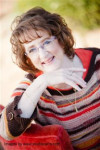 Today on Crimepieces, I’m delighted to have Margot Kinberg sharing her music choices. When I first started this blog in 2011, while living in the Athenian heat, Margot commented on my very first book review. She’s been a great supporter of Crimepieces since its early days and also of my own writing. Those of you who know Margot’s own blog, Confessions of a Mystery Novelist, which has been running since 2009, are aware she uses a lyric from a song as the title of each blog post. So music is firmly woven into Margot’s writing.
Today on Crimepieces, I’m delighted to have Margot Kinberg sharing her music choices. When I first started this blog in 2011, while living in the Athenian heat, Margot commented on my very first book review. She’s been a great supporter of Crimepieces since its early days and also of my own writing. Those of you who know Margot’s own blog, Confessions of a Mystery Novelist, which has been running since 2009, are aware she uses a lyric from a song as the title of each blog post. So music is firmly woven into Margot’s writing.
Margot writes the Joel Williams mystery series. Two of them, Publish or Perish and B-Very Flat are available now. Past Tense will be available 1 November and I can’t wait to read it. She is also an Associate Professor.
Hi Margot – do you have particular pieces of music you write to?
The music I listen to when I write really depends on what I’m writing. So, for instance, the music I listened to as I was writing Past Tense was different to what I’ve listened to for other things I’ve written.
In Past Tense, a missing person case from 1974 comes up again when a set of bones are found on the campus of Tilton University. So I wanted music that would evoke the 1970s. Since the victim in this case is a fledgling investigative journalist, I could think of nothing better than David Shire’s theme from Alan J. Pakula’s All The President’s Men. I also listened to other music from the mid-1970s (mostly rock and roll) to keep me inspired.
Has a particular piece of music ever inspired you to write something?
Some of the inspiration for B-Very Flat came from Bach’s Sonata #3 in C Major. The murder victim in that novel is a violin virtuosa, and the novel’s focus is an important violin competition. This piece captures the passion for the violin. Listening to it helped me focus my thoughts and inspired me to create that context.
Could you recommend any particular pieces of music for a specific mood?
Hmmm… everyone’s different about songs’ impacts. But I’ve found that Miles Davis’ Blue in Green is perfect for getting me in the mood to write either lonely passages or those late-at-night contemplative sorts of passages. You know, the sort of scene where a character is sitting with a glass of red wine or a whisky late at night.
Are there any longer pieces you can recommend? If you need to write for an hour, for example, is there a particular composer/artist you’d choose?
As much as I love rock and roll (and I do!!), if I’m going to really concentrate on writing for an hour, I listen to jazz. For instance, I like John Coltrane’s Giant Steps release very much.
What are you working on at the moment?
Thanks for asking. Right now, I’m working on a standalone novel. In it, a fifteen-year-old homeless girl, Staci McKinney, witnesses the aftermath of a murder. The criminals catch sight of her, too. In part, the novel follows Staci as she tries to stay clear of the murderers and survive. As the novel goes on, she’s befriended by Leo Slater, a thief and fence who has his own past history. Staci decides to work with Leo, who in turn, gives her a safe place to live and some protection against the criminals who are looking for her. The novel follows the murder investigation as well as what happens in Staci’s own life. It’s a bit of a departure for me, as it’s a slightly darker novel than what I usually write. So the music that’s inspiring me is quite different, too. For instance, one song I’ve been listening to is Everlast’s What It’s Like (not exactly for family listening…)
Thanks so much for inviting me to be a part of this feature, Sarah!
Thanks for coming on, Margot, and good luck with the writing. The complete list of music chosen by writers can be found on the YouTube channel.


October 21, 2016
Music To Write Books By – Nick Quantrill
 Nick Quantrill joins Crimepieces today to talk about the music he writes to. Nick was born and raised in Hull, an isolated industrial city in East Yorkshire. His crime novels are published by Caffeine Nights. A prolific short story writer, Nick’s work has appeared in various volumes of “The Mammoth Book of Best British Crime”. In 2011,
Nick Quantrill joins Crimepieces today to talk about the music he writes to. Nick was born and raised in Hull, an isolated industrial city in East Yorkshire. His crime novels are published by Caffeine Nights. A prolific short story writer, Nick’s work has appeared in various volumes of “The Mammoth Book of Best British Crime”. In 2011,  Nick became the first person to hold the role of ‘Writer in Residence’ at Hull Kingston Rovers. When not writing fiction, Nick contributes reviews and essays to a variety of football and music websites. He lives with his wife, daughter, cat and the constant fear Hull City will let him down.
Nick became the first person to hold the role of ‘Writer in Residence’ at Hull Kingston Rovers. When not writing fiction, Nick contributes reviews and essays to a variety of football and music websites. He lives with his wife, daughter, cat and the constant fear Hull City will let him down.
Hi Nick. Do you have particular pieces of music you write to?
I have a confession to make. Although I’m a huge music fan, it doesn’t always mix well for me with writing. I’ve never had the luxury of a proper writing space, so I write with constant background noise – my daughter (aged 5), television, radio – I don’t mind. If I have music on, it tends to be something I know backwards, usually The Beatles, so it doesn’t demand too much attention.
Has a particular piece of music ever inspired you to write something?
Kind of. As much as I can point towards certain writers as being an influence, it was having friends in bands that gave me the push to write. My friends in Lithium Joe and Scarper! booked their own gigs, released their own records, sorted their own merchandise etc. It was a very clear lesson in life – if you want to do something, do it. Don’t wait for someone to give you permission.
Could you recommend any particular pieces of music for a specific mood?
I didn’t think I did this until I thought about it. Maybe it’s more a subconscious thing, but if I’m going to write an action scene, I’ll probably have some punk on – bands I was listening to as a teenager, like The Descendents or Green Day. If it’s a more reflective scene and it requires more thought, I often reach for the song-writers who can do in three minutes what we do in 90,000 words – writers like Steve Earle, John K Samson and Jeff Tweedy. Their skills are intimidating, but also very inspiring.
Are there any longer pieces you can recommend? If you need to write for an hour, for example, is there a particular composer/artist you’d chose?
I’m more likely to go back to stuff I know well with The Beatles a constant fixture. Spotify is great for writers (maybe not so great for musicians, though). If you feel the need to hear something, it’s there. I do sometimes have fun figuring out what my characters might like to listen to and then immerse myself in it as I write.
What are you working on at the moment?
I’ve got a couple of things on the go. I have the makings of a second Hull-set crime novel featuring Anna Stone and Luke Carver to follow on from “The Dead Can’t Talk”. Hull is the UK City of Culture next year, and for better or worse, it’s something that needs documenting on the page. I’m also working on a crime novel set in various locations around the north of England, so it’s exciting to be exploring new locations.
Thanks, Nick for taking part. Good luck with the writing. Nick can be found on Twitter: @NickQuantrill and at his website: http://nickquantrill.co.uk


October 20, 2016
Macmillan Collectors Library
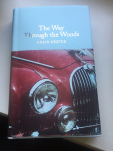 I’ve just received through the post a new edition of The Way Through the Woods by Colin Dexter. The gorgeous new hardback has been reissued to celebrate the thirtieth anniversary of the book, the first in the series featuring Inspector Morse. It has a comprehensive introduction by Barry Forshaw which gives a useful overview of one of my favourite series.
I’ve just received through the post a new edition of The Way Through the Woods by Colin Dexter. The gorgeous new hardback has been reissued to celebrate the thirtieth anniversary of the book, the first in the series featuring Inspector Morse. It has a comprehensive introduction by Barry Forshaw which gives a useful overview of one of my favourite series.
I also enjoyed the TV adaptation, even when the episodes veered from the books, and the sequel Lewis and prequel Endeavour. In Morse, Dexter created an erudite detective who continues to fascinate.
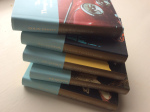 I’ve now got hold of four more of the books in the Macmillan library. Three of them are Sherlock Holmes short story collections with afterwords by David Stuart Davies and the other is a selection of classic locked-room mysteries. I have to admit, this isn’t my favourite type of crime novel but then short story does give you the opportunity to dip in and out of the genre.
I’ve now got hold of four more of the books in the Macmillan library. Three of them are Sherlock Holmes short story collections with afterwords by David Stuart Davies and the other is a selection of classic locked-room mysteries. I have to admit, this isn’t my favourite type of crime novel but then short story does give you the opportunity to dip in and out of the genre.
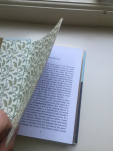 The books are beautifully presented with lovely endpapers. The print is slightly small but no more than other books I buy. Either that or my eyesight is going! They’re a really beautiful addition to my bookshelves. Do any other readers buy books for their covers?
The books are beautifully presented with lovely endpapers. The print is slightly small but no more than other books I buy. Either that or my eyesight is going! They’re a really beautiful addition to my bookshelves. Do any other readers buy books for their covers?


October 17, 2016
Scandi Crime Fiction Round-Up
Reading continues apace for The Petrona Award which we’ll be awarding at Crimefest in May next year. The event in Bristol is one of my favourite crime fiction conferences and I always look forward to it. I see that they have a great Nordic line-up of authors and I’m particularly looking forward to meeting K O Dahl.
I’ve also booked for next years Bouchercon in the Toronto which is very exciting. I’ve been to Canada once before. It’s a beautiful country and I’ve long wanted to visit Toronto. So I’ll be combining crime fiction and sightseeing.
 Leif G W Persson won the Petrona Award in 2014 for Linda, As In The Linda Murder. His books are of consistently high quality and are complemented by Neil Smith’s excellent translations. The Dying Detective is possible my favourite to date. Retired Chief of the National Crime Police, Lars Martin Johansson suffers a stroke. While he is in hospital, his consultant confides that she believes her clergyman father may have been given a clue to the identity of a young girl’s murderer. Lars, from his bedside, rounds up former colleagues and family members to follow the trail of the cold case as his health deteriorates. Superbly plotted it has Persson’s characteristic grasp of the frailties of human nature. I don’t think there’s a writer like him.
Leif G W Persson won the Petrona Award in 2014 for Linda, As In The Linda Murder. His books are of consistently high quality and are complemented by Neil Smith’s excellent translations. The Dying Detective is possible my favourite to date. Retired Chief of the National Crime Police, Lars Martin Johansson suffers a stroke. While he is in hospital, his consultant confides that she believes her clergyman father may have been given a clue to the identity of a young girl’s murderer. Lars, from his bedside, rounds up former colleagues and family members to follow the trail of the cold case as his health deteriorates. Superbly plotted it has Persson’s characteristic grasp of the frailties of human nature. I don’t think there’s a writer like him.
 I’ve read a couple of books by Camilla Grebe which she wrote with her sister Asa Traff. The Ice Beneath Her is the first book as a solo author and is an interesting psychological thriller. Sales assistant Emma Bohman has been abruptly dropped by her wealthy lover, the boos of a famous clothing store. When a woman is found beheaded in his house, police search for the missing tycoon while the narrative rewinds two months and shows Emma’s increasing conviction that she is under threat. The split narrative, in terms of both voice and timeline works well and the readers is pulled in various directions before the final reveal. The translation was by Elizabeth Clark Wessel.
I’ve read a couple of books by Camilla Grebe which she wrote with her sister Asa Traff. The Ice Beneath Her is the first book as a solo author and is an interesting psychological thriller. Sales assistant Emma Bohman has been abruptly dropped by her wealthy lover, the boos of a famous clothing store. When a woman is found beheaded in his house, police search for the missing tycoon while the narrative rewinds two months and shows Emma’s increasing conviction that she is under threat. The split narrative, in terms of both voice and timeline works well and the readers is pulled in various directions before the final reveal. The translation was by Elizabeth Clark Wessel.
 Liza Marklund’s series featuring journalist Annika Bengtzon appears to come to an end with The Final Word. For me, it’s the end of an era; Marklund was one of the early Scandinavian writer’s I read and I’ve particularly loved the the drama of Annika’s private life. The Final Word is, like her other books, a good balance of investigation and personal story although there is a more wistful tone to the narrative. I hope it’s not the end for Annika as she’s one of my favourite Scandi characters. I’ll keep my fingers crossed. The translation was by Neil Smith.
Liza Marklund’s series featuring journalist Annika Bengtzon appears to come to an end with The Final Word. For me, it’s the end of an era; Marklund was one of the early Scandinavian writer’s I read and I’ve particularly loved the the drama of Annika’s private life. The Final Word is, like her other books, a good balance of investigation and personal story although there is a more wistful tone to the narrative. I hope it’s not the end for Annika as she’s one of my favourite Scandi characters. I’ll keep my fingers crossed. The translation was by Neil Smith.


October 14, 2016
Music to Write Books By – Cassandra Parkin
 Today on Crimepieces I have Cassandra Parkin sharing the music she writes her books to. Cassandra is an East Yorkshire writer with Cornish roots and a passion for fairy-tales. Her short story collection, New World Fairy Tales (Salt Publishing), won the 2011 Scott Prize for Short Stories and her debut novel The Summer We All Ran Away (Legend Press) was nominated for the Amazon Rising Stars award. Her second novel The Beach Hut (Legend Press) was published in 2015 and her third novel Lily’s House (Legend Press) will be published tomorrow!
Today on Crimepieces I have Cassandra Parkin sharing the music she writes her books to. Cassandra is an East Yorkshire writer with Cornish roots and a passion for fairy-tales. Her short story collection, New World Fairy Tales (Salt Publishing), won the 2011 Scott Prize for Short Stories and her debut novel The Summer We All Ran Away (Legend Press) was nominated for the Amazon Rising Stars award. Her second novel The Beach Hut (Legend Press) was published in 2015 and her third novel Lily’s House (Legend Press) will be published tomorrow!
Cassandra, do you have particular pieces of music you write to?
In common with many other writers, I find the music of Tom Waits an endless source of inspiration. His album “Rain Dogs” saw me through the early drafts of my first novel The Summer We All Ran Away, while “Bone Machine” helped me find my inner Weird when writing my second, The Beach Hut.
I also love the Cornish shanty group “The Fisherman’s Friends”, who are absolutely amazing and one of the most incredible live-music experiences I’ve ever had. As well as taking me instantly back to my parents’ and grandparents’ home in Cornwall, sea shanties were written specifically as songs to make very hard work flow a little more easily. Admittedly writing is not all that much like hauling in nets or raising sails, but it works for me.
Finally, I love Gregorian plainsong – I think because it was written with the specific purpose of inspiring a state of meditation and contemplation. I’m not a Christian, but I find plainsong helps me get in touch with the awareness of how vast and beautiful our world is, and how lucky I am to be a part of it. I hope the monks don’t mind.
Has a particular piece of music ever inspired you to write something?
There’s a lyric in Tom Waits’s song “Mr Siegal” that has haunted me since the first time I heard it:
“You got to tell me, brave Captain,
Why are the wicked so strong?
How do the angels get to sleep
When the devil leaves his porchlight on?”
I come back to those four lines whenever I need to write bad characters sympathetically.
Could you recommend any particular pieces of music for a specific mood ?
For my novel “Lily’s House” – about a woman who comes back to her estranged grandmother’s house to clear it after her death, and all the old family skeletons that come tumbling out of the cupboards – I needed to find my way back to the relationship I had with my own amazing and lovely great-aunt, who I used to go to church with on Sundays in the school holidays. Then afterwards we’d go back to her house and have roast chicken for lunch, and she would ruthlessly critique the outfit choices of all the other churchgoers and tell me terrible gossipy stories about everyone’s pasts and presents. It made me realise that being old doesn’t mean giving up on love and intrigue and arguments and secrets and excitement.
The music that took me back to those Sundays were the hymns we used to sing. The church was the Wesleyan Methodist chapel in Falmouth, so I especially remember the watery hymns – “For Those In Peril On The Sea”, “Will Your Anchor Hold”, “Lord, Whom Wind and Seas Obey”, and lots of others.
Are there any longer pieces you can recommend? If you need to write for an hour, for example, is there a particular composer/artist you’d chose?
I particularly love Bach’s “Goldberg Variations”. I think it’s because they’re so unobtrusive, but also so complex – they feel like simple background music but there are so many amazing tricks and connections hidden within them. They’re incredibly satisfying. Also – and much less cerebrally – they remind me of Hannibal Lecter, who also liked them very much, and who is one of my favourite literary monsters.
What are you working on at the moment?
I’m working on my fourth novel, “The Winter’s Child”. It’s set in my current home city of Hull, during its 2017 year as City of Culture, and it’s about a woman whose son went missing and has never been found. It’s quite a gothic sort of a story – filled with fortune-tellers and psychics and strange experiences. I’m really enjoying writing it.
Thanks, Cassandra for taking part and good luck with The Winter’s Child.


October 7, 2016
Music to Write Books By – Barry Forshaw
 Every Friday I run a post where authors share with us the music they listen to as they write. The full list of music can be found on the dedicated Youtube channel.
Every Friday I run a post where authors share with us the music they listen to as they write. The full list of music can be found on the dedicated Youtube channel.
Today, I have Barry Forshaw sharing his music choices. Barry is a writer, broadcaster and journalist who has written books on a wide variety of subjects, including British Crime Writing: An Encyclopedia, The Rough Guide to Crime Fiction, Brit Noir, Nordic Noir, Euro Noir and Death in a Cold Climate: Scandinavian Crime Fiction. He also edits the popular crime fiction website, Crime Time, and writes on classical music.
Given Barry’s expertise in music, he’s helpfully suggested the best CDs to listen to and discussed the recordings’ merits. As most of these tracks aren’t available on YouTube, I’ve given some alternative links so you can get a flavour of the music he’s talking about. He’s persuasive in discussing the quality of his own chosen recording though so I can see a few purchases taking place.
Barry, thanks for taking part in this. Do you have particular pieces of music you write to?
I may be known (if at all!) as a crime fiction commentator with such books as Brit Noir, Nordic Noir and Euro Noir — but those who know me (such as the crime novelist Sarah Ward, herself a singer) are aware of my dark secret: I edit a site called Classical CD Choice (http://www.cdchoice.co.uk/). As this might suggest, serious music is my thing (although I’m also an aficionado of jazz, film soundtracks, Broadway musicals and singers such as Frank Sinatra and Ella Fitzgerald).
As to writing my books, such activity is always – and I mean always – done to the accompaniment of classical music. Which in the final analysis is, let’s face it, wrong – serious music should be given one’s full attention, shouldn’t it? But in the real world, one doesn’t always have the time – there are books to be written, and pieces for newspapers (I’m the crime fiction critic for the Financial Times). And one composer I listen to an inordinate amount of time is another favourite I share with Sarah Ward: Ralph Vaughan Williams.
When I was interviewing Simon Heffer about his sympathetic study of the composer, I took gentle exception to his claiming the composer for the political Right (he was adducing RVW’s quintessential Englishness); ironically, when the interview appeared and I mildly suggested that Elgar rather than Vaughan Williams might have been of a Tory nature, I received a deal of critical mail, interpreting my comment as an attack on Elgar. God forbid — I had simply tried to draw a distinction between the left-leaning Vaughan Williams (whose political persuasions and agnosticism were not automatic characteristics of his class) and the older composer. But for those like myself — who love every aspect of the composer’s work from the exquisite beauty of his string writing to the ringing brass fanfares and thundering organ passages of the ballet Job — RVW can do no wrong, Although The Lark Ascending has been voted the most popular piece of classical music in the UK, exquisite though it is, I’d suggest that a far more bracing experience may be found in the composer’s tough muscular Fourth Symphony, an orchestral tour the force that will leave you pleasurably exhausted, particularly in the white-hot performance by the late Richard Hickox. (VAUGHAN WILLIAMS: SYMPHONY NO. 4; London Symphony Orchestra , Hickox, Chandos CHSA 5003)
Has a particular piece of music ever inspired you to write something?
If I need to be jolted out of apathy and placed in a creative mood, there are three pieces by Richard Strauss, which always do the trick: Richard STRAUSS: DON JUAN,
DEATH AND TRANSFIGURATION,
TILL EULENSPIEGEL’S MERRY PRANKS.
Try the Pittsburgh Symphony Orchestra, Manfred Honeck/Reference Recordings SACD F707).The mastery of the orchestra which is the hallmark of Richard Strauss’s achievement is fully evident in this disc of three of the composer’s greatest tone poems, and it is a particular pleasure to enjoy this combination played with such dedication and verve here.
Could you recommend any particular pieces of music for a specific mood?
Well, if you’re writing about murder – or (in my case) writing about people write about murder, why not have your blood curdled by an astonishing and brutal piece of music which features one of the most gruesome murders in classical music, Bartok’s The Miraculous Mandarin? (BARTOK: ORCHESTRAL PIECES, MUSIC FOR STRINGS, PERCUSSION AND CELESTA, SUITE FROM‘THE MIRACULOUS MANDARIN/Melbourne Symphony Orchestra, Edward Gardner/Chandos CHSA 5130). The first thing to note about these orchestral showpieces from the ever-reliable Chandos is the sheer visceral impact of the surround-sound recording. If earlier conductors (notably Dorati and Solti) have found more Hungarian panache in the scores, Bartok’s music has never sounded better in these recordings which do full justice to the immense richness of the scoring. Edward Gardner and the Melbourne Symphony Orchestra perform Music for Strings, Percussion, and Celesta, a piece that took on wider recognition when it was used by Stanley Kubrick on the soundtrack of The Shining. Also on this disc is the Suite from Bartók’s dark and gritty ballet The Miraculous Mandarin. The work, featuring some of the most colourful music Bartók wrote, tells the story of three criminals who force a young woman to lure passers-by into a room where they intend to rob them. The third passer-by to enter the room is the mandarin. The men try to kill him, but only when the girl satisfies his desire do his wounds begin to bleed, and he dies.
Are there any longer works you can recommend? If you need to write for an hour, for example, is there a particular composer/artist you’d chose?
For an hour of Danish music genius, I would recommend two remarkable symphonies by the composer Carl Nielsen.(NIELSEN: SYMPHONIES 4 & 5, Royal Stockholm Philharmonic Orchestra, Sakari Oramo/BIS SACD 2028) The test (as much as anything else) of any performance of Nielsen’s dramatic Fifth Symphony is whether or not the side drum is encouraged to obey the composer’s instruction to ‘halt the progress of the orchestra’ – precisely what happens on the superb recording by Sakari Oramo, the first since the legendary Jascha Horenstein version on Unicorn to really take the composer at his word. The disc (in superb surround sound) also boasts a splendid version of Nielsen’s Fourth Symphony.
What are you working on at the moment?
I’ve just about finished American Noir (so I listened to Aaron Copland, Leonard Bernstein, Duke Ellington and George Gershwin), and I’m polishing Italian Cinema – so Respighi is a good fit for this. The Italian composer was the finest composer of purely orchestral music from a country best known for its opera composers and the sheer orchestral colour of his music never ceases to exhilarate. Notably his Roman Trilogy: (RESPIGHI – ROMAN TRILOGY: FONTANE DI ROMA/PINI DI ROMA/FESTE ROMANE, São Paulo Symphony Orchestra/ John Neschling/BIS SACD 1720). The Roman Trilogy (the tone poems Pines of Rome, Fountains of Rome and Roman Festivals) is one of the most breathtaking sequences of orchestral showpieces in the repertoire, and its rich opulence is finally emerging from the cloud of sniffy disapproval it suffered under. This amazing recording – quite the most breathtaking the trilogy has ever enjoyed — will hasten that process. Thrillingly, the recording engineers have utilised multiple channels to the full on the Super Audio recording (brass blazes from the rear channels, rather than those channels just being used for ambience) – with the volume turned up, your pulse is likely to be racing. Neschling’s highly recommendable set may, however, require the registering of a few caveats: an amazing sound stage, as noted, but a recessed organ and some undercharged elements such as the Neapolitan tune, played in rather straight-laced fashion. But these are small points; many moments (such as the cataclysmic finales) absolutely take the breath away. A truly exhilarating disc.
Perhaps, though, not music to write to…
Thanks, Barry, for taking part and good luck with American Noir and Italian Cinema. Barry can be found on social media via the links below.
Twitter: @BarryForshaw3
Website: www. barryforshaw.co.uk







